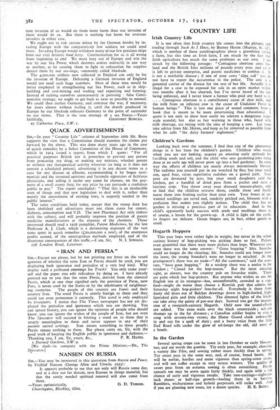QUACK ADVERTISEMENTS
Stet,—In your " Country Life " column of September 26th Mr. Bates supports the view that a Commission should examine the claims put forward by the above. This was done many years ago in the case of quack remedies by a Select Committee of the House of Commons, which in 1914 issued a report, from which I quote: " For all practical purposes British law is powerless to prevent any person from procuring any drug, or making any mixture, whether potent or without any therapeutical activity whatever (as long as it does not contain a scheduled poison), advertising it in any decent terms as a cure for any disease or ailment, recommending it by bogus testi- monials and the invented opinions and facsimile signatures of fictitious physicians, and selling it under any name he chooses, on the pay- ment of a small stamp duty, for any price he can persuade a credulous public to pay." The report concluded: " That this is an intolerable state of things and that new legislation to deal with it, rather than merely the amendment of existing laws, is urgently needed in the public interest."
The same conditions hold today, except that the stamp duty has been abolished and advertisers must not claim cures for cancer, diabetes, consumption and V.D. The new Pharmacy Act only tinkers with the subject, and will probably improve the position of patent medicine manufacturers at the expense of the chemists. Those interested should read a 1938 pamphlet, Patent Medicines, by the late Professor A. J. Clark, which is a devastating exposure of the vast sums spent in quack remedies (£2o,000,000 a year), of the enormous profits earned, of the unscrupulous methods employed, and of the


























 Previous page
Previous page